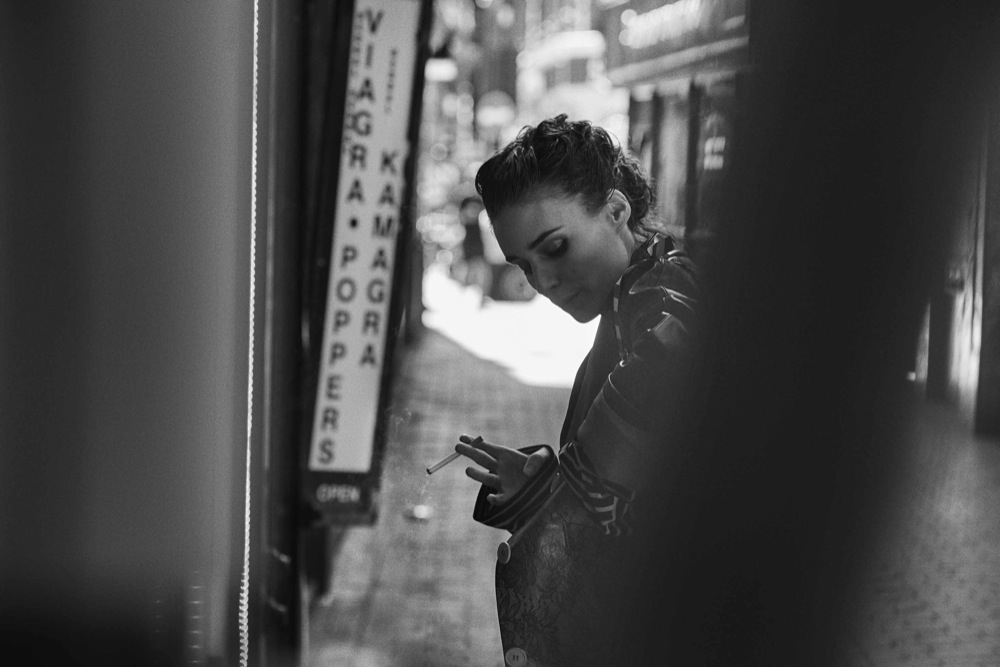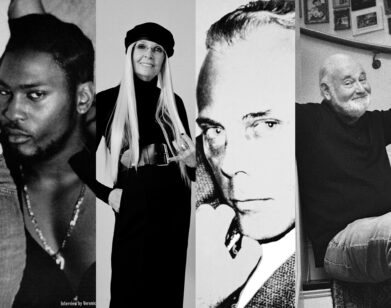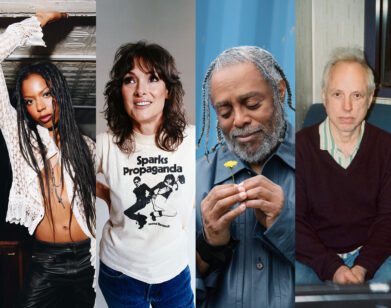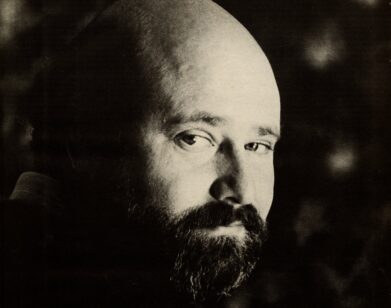Rooney Mara
I pick up energy really easily. Even if I go to the grocery store and no one is paying attention to me, I can pick up other people’s moods and it’s really intense. ROONEY MARA
It’s hard to imagine any one better suited to bring Patricia Highsmith’s densely meditative novel The Price of Salt to the screen than Rooney Mara. Who but the girl formerly with the dragon tattoo could make so alluring the intense interiority of Highsmith’s protagonist, Therese? Even when Mara presents a frosty and furrowed façade, as she did in the incest-rotten arctic of Stieg Larsson’s Sweden, and does here in an Audrey Hepburn-y New York of the 1950s, she doesn’t reject the camera’s attention, but lets us see the horror or awkwardness or drama of the moment through her eyes. Guarded though her characters may be, Mara the actress allows us in, to be as flooded with the feeling as she is. It’s an engrossing thing to watch, and Mara’s performance in Todd Haynes‘s film from the Highsmith novel, titled Carol, shared the award for best actress at Cannes, and it may be her best to date—candid and deep, but with a sort of lightness.
In fact, when the titular character, an enchanting woman and object of Therese’s interest and affection, played by Cate Blanchett, tells young Therese that she has bloomed and come into her own, you feel yourself nodding in agreement. This is a fuller and more buoyant, more affecting kind of performance. Not that any of Mara’s intensity is gone. But where she played Lisbeth Salander in The Girl With the Dragon Tattoo (2011) as a spiky land mine of rage and brilliance—sharp and thorny—her Therese is like an ice cube beginning to thaw with the febrile awakening of her appetites and carnality. She is the still, deep water coming to a boil. And she is beginning to make a habit of it: Witness the graceful ebullience she gives her Tiger Lily, gliding around Neverland in Joe Wright’s Pan, out last month; see too the vigor of her Olivia in Stephen Daldry’s adventure-thriller Trash—Mara is bubbling.
But the young actress, 30, from a Bedford, New York, football family, who broke out in 2010 with her part in David Fincher’s The Social Network and was nominated for the Best Actress Oscar for her performance in Fincher’s Dragon Tattoo, has been one of our most compelling performers for a few years now. So what is behind this new, most recent surge, which will include forthcoming films by Terrence Malick and Jim Sheridan? How deep do those waters run? As Mara tells her pal Annie Clark, a.k.a. the rock goddess St. Vincent, she’s trying to find out, diving as deep as she can.
ANNIE CLARK: Hey, Roon-dog. It’s a pleasure. You’re going to regret every moment of this.
ROONEY MARA: No, I’m not!
CLARK: Don’t look at my notes. I prepped for this for a long time. I’ve been prepping for this for three years.
MARA: Which is when we first met.
CLARK: It was 2012. The first time I met you I was supposed to give you a guitar lesson.
MARA: What was that place called?
CLARK: Electric Lady Studios. Patti Smith was recently there doing a private show of Horses.
MARA: She was on the Terrence Malick movie I did. She shot, like, three days. I don’t know if she’ll end up in the cut, but her first day, she knocked on my trailer door—I hadn’t met her yet—and she introduced herself, because she was a huge fan of The Girl With the Dragon Tattoo. I was like [screams]. We had scenes together where she’s showing me stuff on the guitar, and then she does a show in Austin. They really wanted me to go out on stage and play with her, which I refused to do. But she put a chair on stage for me to sit and played a song to me. It was amazing. She was playing herself but giving my character all this advice. And it was actually really good advice, all about relationships.
CLARK: So in the movie she’s “Patti Smith.”
MARA: She’s playing herself. My character idolized her.
CLARK: Who is your character in the movie?
MARA: I have no idea.
CLARK: That must have been a challenge for you as an actor. [laughs]
MARA: The day I first met you, at Electric Lady, was my second guitar lesson. I wanted to learn on the acoustic, and I had no idea who you were. You probably had no idea who I was. And I had no idea what we were supposed to be doing.
CLARK: Me neither. And when I got there, the dude was like, “Oh, you didn’t bring your effects pedals.” I was like, “My pedals?” I’d walked from my East Village apartment with a limp because I’d broken my foot.
MARA: I was mortified. And then I went home and googled you and YouTubed you and I was even more mortified.
CLARK: Oh, no, because you were actually good. You claimed that you didn’t do this, but you did play “Hey Jude.” In the movie your character is a singer-songwriter trying to get her start?
MARA: Yeah. And I played with the Black Lips at one of the Austin music festivals. Oh my God, I got really drunk to do it. I was learning on the acoustic guitar. I don’t know how to play electric guitar. So I had to kind of learn it, just so I knew where my hands should be, but there was no way I was going to actually play.
CLARK: So did you just mime the guitar?
MARA: Yeah. Well, it was unplugged.
CLARK: Did you make the decision to keep yourself unplugged?
MARA: Yes, definitely.
CLARK: But the Black Lips, they’re fun—punk rock, dicks out …
MARA: Yeah, I think one of them made themselves throw up onstage during the performance. And one of them whipped his dick out. It was quite the experience. I should have come up with something a little more exciting, but I was just drinking whiskey and got really drunk. I have stage fright. It’s terrifying.
CLARK: If you have stage fright, how do you do movies?
MARA: Because there’s no stage.
CLARK: Oh.
MARA: On film, yes, the camera is watching you, but it’s so intimate. But it’s just you and the other actor—and then there’s some people watching the monitor. I would like to do theater, but I’m terrified. I have such bad stage fright.
CLARK: What are you afraid is going to happen?
MARA: I hate being on display like that. On stage, there are hundreds of people watching you. It’s so much energy directed at you. I pick up energy really easily. Even if I go to the grocery store and no one is paying attention to me, I can pick up other people’s moods and it’s really intense. I would not be able to perform on stage the way you do, but I’m sure it’s exhilarating.
CLARK: Well, I don’t pick up energy at all, so I’m sure that’s how I do it. [laughs]
MARA: You’re just like flatlining? No, I’m sure you get energy from your audience; it’s a high.
CLARK: I get energy, but it’s not, “Oh, so and so had bad pizza.” It’s not like that.
MARA: No, I don’t know if I could be picking up on that in such a large audience. But it would be a lot of energy. It’s also scary; everyone’s judging you live. I don’t know how to play the guitar, so having to be on stage in front of people doing something you don’t really know how to do, it’s terrifying.
I like being alone. I need a lot of alone time as a human ROONEY MARA
CLARK: Of course. Being on stage feeling ill-prepared for whatever it is you’re supposed to be doing is terrifying.
MARA: Yeah, and it was the middle of the day. People were sober …
CLARK: Wow. I always feel like it’s a bum deal when actors who don’t play instruments are meant to hold an instrument and look like they play it. It takes a while to get comfortable holding the thing.
MARA: I don’t think I ever got there. On Girl With the Dragon Tattoo I spent two or three months learning how to ride a motorcycle. I wasn’t really riding the motorcycle in 98 percent of the movie, but the shots of me getting on and off had to look like I had been doing it for years and years.
CLARK: They were believable. You were a psycho badass in that movie. I remember seeing that movie with my best friend, and I think it was a brunch.
MARA: Oh, daytime.
CLARK: Yeah, we were sort of drunk, and I didn’t know about the anal rape scene …
MARA: You didn’t know about that? That must have been quite the afternoon. But you were in a scene on the Terrence Malick film. Wasn’t that really scary?
CLARK: It was horrifying.
MARA: Imagine having to do that in front of a crowd, in the middle of the day.
CLARK: That just sounds like the worst thing I’ve ever heard of. I feel like we have the same shame and humiliation reflexes, maybe. That’s the last thing you want, to be humiliated. So, like, why do you do what you do, you know what I mean? [laughs]
MARA: We’re trying to overcome our fears.
CLARK: So how did you prepare for the role in Carol?
MARA: Well, first, there’s a book, The Price of Salt, written from my character’s point of view, so all the work is pretty much done. The book tells you pretty much everything you need to know. And then the script is a beautifully adapted version of the book. I had several months talking to Todd Haynes about it—he had done so much research that he shared with Cate and me. He made this book full of references of how he wanted the movie to look and feel—all these photographs from that era that inspired him. And he sent, like, five different mix CDs—like, not even playlists, but actual CDs—with all the songs that inspired him for the film. He gave me a bunch of movies to watch. So I kind of knew before I got there what kind of movie I was going to be in. I knew the movie that he was going for, and that’s really helpful.
CLARK: I can tell you were totally bored by that question, and you’ve given that answer before. I apologize.
MARA: I haven’t given that answer that many times yet, but it’s good practice.
CLARK: I mean, that was a really good answer. It’s going to translate well in print.
MARA: [laughs] Great.
CLARK: I haven’t seen the film, but the trailer was so beautiful. It fills you with a certain kind of longing, a longing for something just out of reach … I guess that’s what longing is.
MARA: The movie is visually stunning; Ed Lachman was the DP. It doesn’t look like a movie that was made in 2015; it looks like it could’ve been made in the ’50s. And the costumes, Sandy Powell. You were there.
CLARK: I was there. I visited the set. I was hanging out by the monitors when you were shooting a scene in a cafeteria. My lighting designer is good friends with Todd, and we were coming through on tour. I was, like, loitering on set, and you would come up and chitchat in between takes. Maybe you were relieved to see someone in Cincinnati you sort of knew. That hotel actually has a Louisville connection. The people who own it have this amazing ranch outside of Louisville, and I went there on the David Byrne tour. They have the most incredible art collection.
MARA: You must stay in different hotels all the time.
CLARK: Like, every other night.
MARA: At least when I do a movie, I’m in the same place for five weeks or two months.
CLARK: Does that make you feel comfortable? Because it’s not like you have a home; you have a room.
MARA: Yeah, but in that room I set up a little kitchen for myself. I had a mini fridge. I brought my Vitamix. I made a smoothie every morning. I had a toaster.
CLARK: Gluten free?
MARA: Gluten-free toast, yeah.
CLARK: Did you ever get lonely at night?
MARA: I like being alone. I need a lot of alone time as a human. And especially on a movie set when you’re around people all day long. So it’s actually kind of nice to go home to a hotel and be alone and unwind. But, of course, it gets lonely. It’s one of the weird parts about being an actor or a musician—we’re Gypsies. People ask me where I live, and I say L.A. or New York, but really I don’t spend much time in either of those places. I’m constantly either in hotels or somewhere else. But I like it. I might get tired of it at some point, but for now I like being a nomad.
CLARK: Me too. People ask, “What do you do to get your creature comforts when you’re on set?” And I’m like, “I don’t know,” because I’m used to being here.
MARA: Yeah. Or people are like, “What do you do in your off time?” But you don’t really have a life. I’m like, “I go to the post office. I go see friends that I haven’t seen in three months.”
CLARK: And make sure those friends aren’t fucking mad at you for being away for a year … Is that your phone? Oh, cute. “Back late tonight,” says the dude.
MARA: The dude?
CLARK: The dude I know from the thing …
MARA: We’ll talk about that off the record. What were we talking about? Living on the road. Coming back into the real world. What do you do? You just finished a tour, what are you doing?
CLARK: I started writing my record. I can’t sit still for that long.
MARA: I can’t sit still for that long either, but I can’t just, like, go into another movie. There’s only so many movies you can do. I start to get really self-loathing and sick of myself. And I think in order to act, you need to live a little bit to fill yourself with experience.
CLARK: You do. And being on set is not enough experience.
MARA: No, there’s no life experience. You’re living in a bubble working 14, 15 hours a day, and then you go to sleep and do it again the next day.
CLARK: How do you pretend to be somebody else?
MARA: It’s not that different than when you’re 4 years old playing house. I’m really good at playing house. I love playing house.
CLARK: But are you insane? [Mara laughs] I mean that with all affection. Like, how do you stay tethered to who you are?
MARA: I’m probably more insane than most people, and less than a lot of others. I’m somewhere in the middle. It can get confusing, when you’re working 15 hours a day playing someone else, certainly some of that creeps in. That’s why, when you stop a film, it’s so hard; you have to come down off of it. You’re like, “Oh, wait, that wasn’t real life. I’m probably never going to see most of those people again.” It’s like being at summer camp. Everyone gets so close so fast, and then the truth is, a lot of times you don’t really see those people again. I’ve made some really good friends from movies, but a lot of the time it’s a very isolated experience that lives and dies during the production.
CLARK: It’s an ecosystem, and then they’re gone. But you don’t have abandonment issues?
MARA: No, I do. But they have nothing to do with acting. [laughs]
CLARK: But do they get triggered when you leave a set?
MARA: Not really. The thing is, on a film, you’re together for a short period of time, but then the movie comes out and you see them again, and it’s kind of like you never left each other.
CLARK: That’s really nice. I feel like most people don’t get to forge extremely close bonds with their co-workers. Most people who are working a nine-to-five aren’t like, “Oh, my God, Dave in sales!” It’s special.
MARA: It is. And everyone on set is also a Gypsy. We’re all like carnie folk. We’re all freaks. We’re all insane. But there is an understanding there.
CLARK: What kind of impact does that have on the person over the long term?
MARA: We’ll see. When I was much younger—because I’m so old now—I’d become friends with everyone. I was so enthusiastic. And then, the older you get, it’s like you’re friends during the day, but you know this isn’t real life, you have better boundaries. I think it’s much harder for kids, because they don’t have boundaries up. I just did Pan with Levi [Miller], who played Peter Pan, and he was still young enough that I’m sure he doesn’t have great boundaries yet. I remember when we wrapped that movie, it was really hard for him to say goodbye to everyone. Because he went from being a normal kid to being on a set where there’s so much attention on him. Really, when you’re an actor on set, people treat you like a giant baby. They don’t let you do anything. Like, “Do you need any food? Do you need the bathroom?” So he had so much attention on him for that four-month shoot, and then he had to go home and be a kid again. We all became really close on that movie, and it was so sad saying goodbye to him, because I could just see how sad he was. But I think it gets easier as you get older. Levi was obsessed with Cara [Delevingne]. And I got really jealous, because he was super into me, and then all of a sudden it was time to shoot the mermaid scenes, and he kind of forgot about me. I felt super abandoned and tossed aside.
It’s not that different than when you’re 4 years old playing house. I’m really good at playing house. I love playing house. ROONEY MARA
CLARK: So you have micro-abandonment issues.
MARA: That was a micro; there are larger ones. He was just so sweet and so curious and earnest and wanted to know about everything, and wasn’t embarrassed. If he wanted to know what a word meant, he was like, “What does that mean?” Directors give me references all the time and I’m like, “Oh, yeah,” and I write it down and look it up later.
CLARK: He probably learned a lot.
MARA: Totally. And meeting Cara was his dream come true.
CLARK: Did you and Cara have scenes together?
MARA: No. I mean, we will have scenes together, but I wasn’t there. It was green screen. I was just looking at a little pink X-mark.
CLARK: But that little pink X-mark: Oscar territory. Which, speaking of, Carol … Cate? Cate, just, period.
MARA: She doesn’t even need a last name. Just Cate with a C.
CLARK: Such a better spelling of Cate.
MARA: Well, my sister’s name is Kate, and she spells it with a K.
CLARK: Oh, I’m so sorry.
MARA: They’re both valid. But I remember the first time I saw Cate, in Elizabeth [1998]. I think I was 13. I went to our little local theater with my mom, and I was like, “Oh, my God, who is that woman?” She’s just so incredible. It was pretty easy to pretend to be enamored by her. And she’s quick and witty and funny. She’s very confident. It’s amazing. Usually it’s not that great to meet your idols and work with them; it’s kind of a letdown. This definitely wasn’t. She’s much different than I had in my head, but kind of better, in a way. It was also obviously terrifying.
CLARK: What were you scared of?
MARA: Just working with someone who you think is the best at what you do. It’s terrifying to stand beside them and try to do it with them.
CLARK: How did you overcome that?
MARA: I didn’t try to overcome it, because it works for our dynamic in the movie, so I went with it.
ANNIE CLARK, A.K.A ST. VINCENT, IS A GRAMMY-WINNING MUSICIAN. HER MOST RECENT ALBUM, ST. VINCENT, WAS RELEASED IN 2014.







